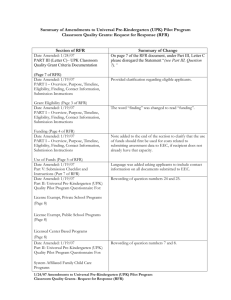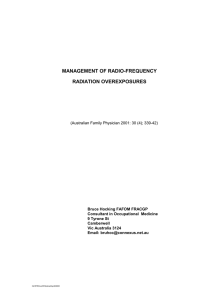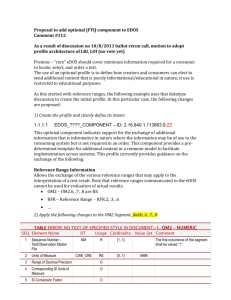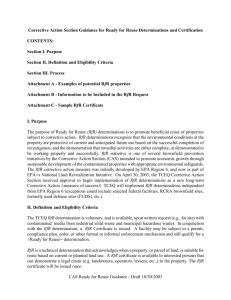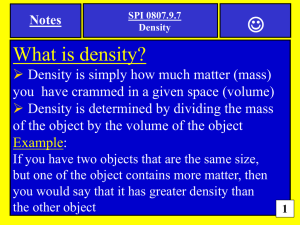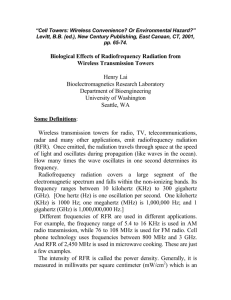electronic RFR System (eRFRS) Orientation
advertisement
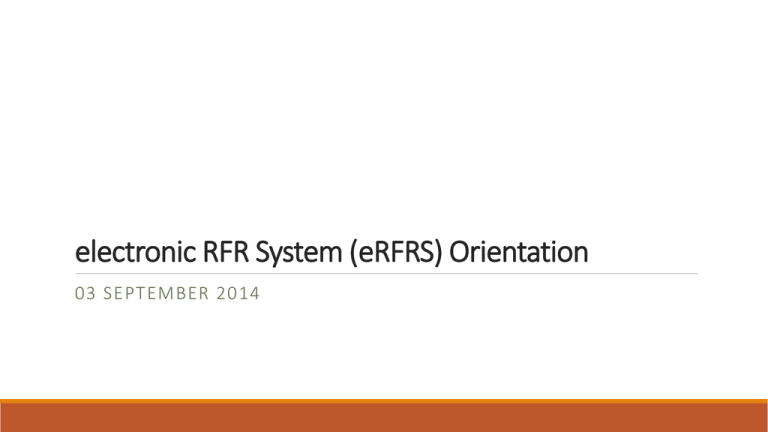
electronic RFR System (eRFRS) Orientation 03 SEPTEMBER 2014 Rationale P33.3B of the P43.9B or 76% of the total program cost are community grants which shall be released to community beneficiaries to implement their approved sub-projects; P30.7B of the P33.3B or 92% are coming from the loan proceeds from development partners (World Bank and Asian Development Bank); Loan Agreements entered by the Government of the Philippines with these development partners prohibit loan proceeds to be co-mingled with each others funds as well as other fund sources; Hence, e-RFR System was crafted to ensure that loan proceeds are not co-mingled. Training Objectives Equip the participants of the features and usability of the e-RFR System. ◦ Transfer knowledge to other e-RFR Users ◦ ACT level – Municipal Financial Analyst ◦ SRPMO level – FA III ◦ RPMO level – FA III for WFP, FA III for SOE and FA III for e-RFR Inform the participants of the RFR Processes at all levels using the e-RFR System Others - Discuss FM Roll During ACT Roll Out Training eRFR System Features... 1. Assign distinct subproject ID which happens upon data entry of the MIBF result; 2. Consolidate Community Grants Disbursement Plan(CGDP) on the basis of the MIBF results and SPI programming done at the community level. ◦ The CGDP shall be the basis for the assigning of appropriate fund source, issuance of Sub-Allotment Advise (SAA) and transfer of community grant funds by the CO to the FO for onward release to the community bank account; 3. Generate and print the RFR for the signature of concerned signatories at all levels containing all necessary SP information previously encoded; and 4. Generate and print Obligation Request (ObR) and Disbursement Voucher (DV) containing the amount requested and the fund source. eRFR System and Review Process BSPMC Assign SPID Issue SAA RFR review and approval Conduct MIBF Conduct SPI physical and financial planning to determine duration of SPI and timing of release of community grants Fill-up bank account number, sign the RFR and submit necessary SD ACT On the basis of the MIBF results, prepare and submit list of prioritized subprojects Submit the SPI Plan Receive the community grant funds for SPI Enter the subproject data as indicated in the Sub-Project Concept Form using the e-RFRS which shall automatically assign a distinct Sub-Project Identification Number (SPID) Provide TA on the completion of supporting documents (SD) and facilitate signing of the RFR RPMO Generate and print the RFR Review the accuracy and completeness of SD and the consistency of information and signatures indicated and recommend approval by RPMO NPMO Validate the data entered in the eRFRS vs. the MIBF results Tag appropriate fund source as indicated in the loan documents Review the SPI Plan Update the e-RFRS to enter the tranching schedule based on the SPI Plan Review the accuracy and completeness of SD and the consistency of information and signatures indicated Release of funds and SPI SRPMO Generate and print ObR Process ObR Approve the RFR Update the e-RFRS to enter the bank account and generate the DV Process the RFR and release funds directly to the community bank account Issue SubAllotment Advise (SAA) and transfer funds to RPMO

